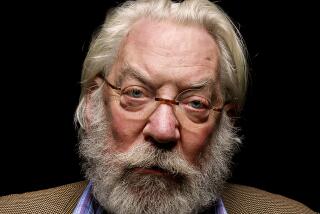Harold Russell, 88; Disabled Actor Won 2 Oscars for ‘The Best Years of Our Lives’
Harold Russell, the disabled World War II veteran who received two Academy Awards for his role in “The Best Years of Our Lives,” has died. He was 88.
Russell, who lost both of his hands in an explosion during the war, died Tuesday of a heart attack in Needham, Mass., his family announced Thursday.
“The Best Years of Our Lives,” was the runaway hit of the 1946 Academy Awards. The film, which dealt with the harsh realities of servicemen adjusting to changed families and a changing country after years of warfare, won seven Academy Awards and a special Oscar, including those for best picture, best director for William Wyler and best actor for Frederic March. It also won for best screenplay, music and editing.
Russell’s two Oscars, one for best supporting actor and a special award from the academy governors, made him the only person in academy history to win two awards for the same role. Years later, he would make headlines again when he decided to sell one of his statuettes.
Born in Nova Scotia, Russell was raised in the Cambridge, Mass., area. After high school, he worked as a meat cutter in a local market.
He joined the Army the day after the attack on Pearl Harbor and was trained as a paratrooper and an explosives expert. On D-day, Russell was training soldiers at Camp Mackall, N.C., in the use of explosives when a defective fuse ignited a charge of TNT.
His hands were so severely injured that they had to be amputated, and he was fitted with hooks. A short time later, he was cast in his first film, an Army documentary, “Diary of a Sergeant,” about the rehabilitation of an amputee.
Although Russell had no speaking role, his presence impressed director Wyler, who saw the film some time later after he had begun early work on “The Best Years of Our Lives.” In an early screenplay for that movie, the Russell character had suffered severe neurological damage causing spastic paralysis. But the movie makers thought the character too difficult for audiences to accept.
Wyler remembered Russell from the training film, and the part of Homer Parrish was rewritten to reflect his disability.
Russell’s portrayal was so well received, both critically and commercially, that he was nominated for best supporting actor. But the field that year included veteran actors Charles Coburn, Clifton Webb and Claude Rains.
The academy decided to give Russell a special Oscar to reflect “the hope and courage he brought to his fellow veterans” through his appearance in the film.
With such stiff competition for supporting actor, the message was clear, he said years later. “They were so certain I wouldn’t win,” he told The Times.
Shirley Temple presented the special award, one of the first of its kind, early in the program, which was broadcast on radio in those pre-television days.
“Then when they announced my name for best supporting actor, no one was more surprised than me,” Russell said. “Well, maybe those guys who voted me the special award.”
In the aftermath of the Oscars experience, he decided to follow advice from the film’s director.
“Wyler told me I should go back to college, because there wasn’t much call for a guy with no hands in the motion picture industry,” Russell said.
He pursued a degree in business at Boston University, wrote an autobiography titled “Victory in My Hands” and later started a public relations business.
He also began what was to be his lifelong quest, to help the disabled.
In that capacity he served as a consultant in business, industry, state and federal governments and even the United Nations.
In 1964, President Lyndon B. Johnson named him chairman of the President’s Committee on Hiring the Handicapped.
Russell’s message in most of his talks to groups of disabled workers was simple: “It’s not what you lost, but what you have left and how you use it.”
He appeared infrequently in Hollywood after “Best Years.”
His credits included small roles in “Inside Moves,” a 1980 film by Richard Donner in which he played a card-playing barfly; and “Dogstown,” by George Hickenlooper, in which he played a disabled World War II veteran. He also appeared in episodes of TV’s “China Beach” and “Trapper John, M.D.”
Russell made headlines in 1992 when he decided to sell his Oscar for best supporting actor.
After placing an ad in Variety, he got a letter from the academy’s then-president, Karl Malden, urging him to reconsider.
“Your own statuettes in particular are among the best known that the academy has ever awarded,” Malden said. “While that fact may give them additional luster on the open market, it also gives particular poignancy to the possibility that either of them could be sold away like an autographed baseball and consigned to who-knows-what future history.”
The academy offered Russell $20,000 not to sell his award, but he held out and eventually sold it for more than $60,000 to an anonymous bidder.
“It wasn’t that we were desperate or hungry,” he said later. “It was just that we have a lot of children and grandchildren, and we wanted to put something away in case any of them ever needed something.”
But he also said the special Oscar had more value to him.
“I’d never sell the special one,” he said. “The war was over, and this was the industry’s way of saying thank you to the veterans.”
He is survived by a son, a daughter, four grandchildren and seven great-grandchildren.
More to Read
Only good movies
Get the Indie Focus newsletter, Mark Olsen's weekly guide to the world of cinema.
You may occasionally receive promotional content from the Los Angeles Times.










